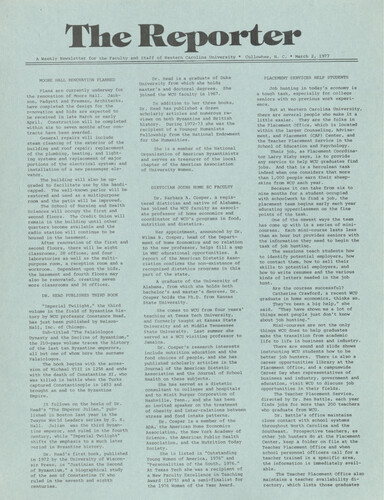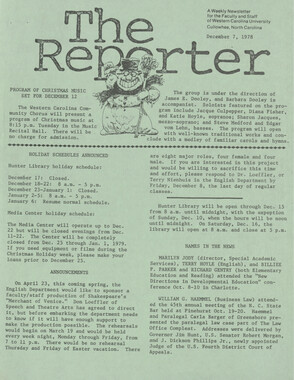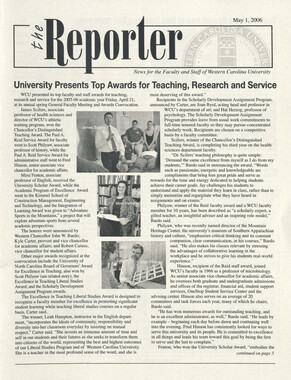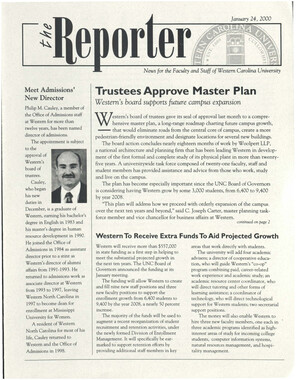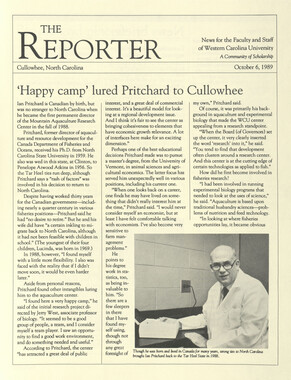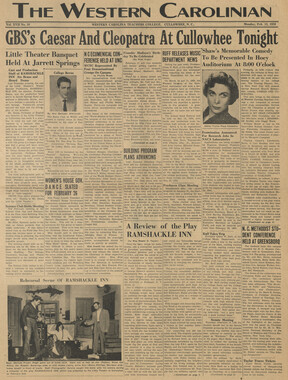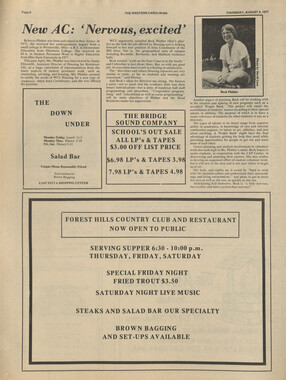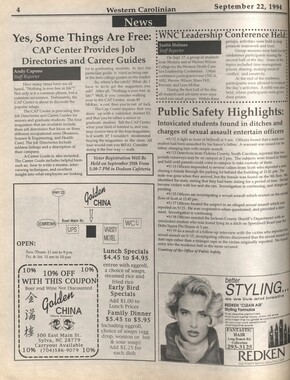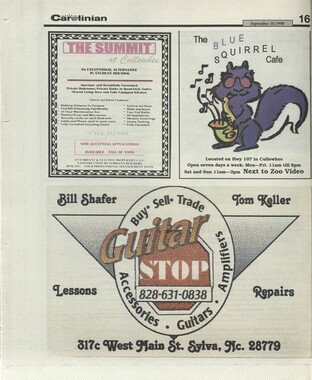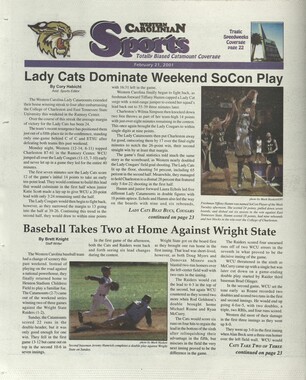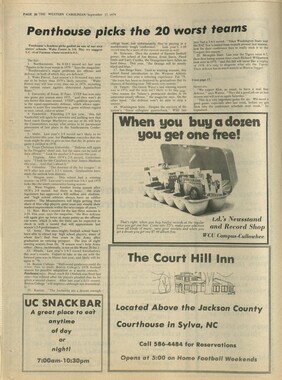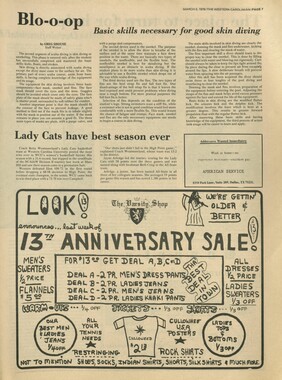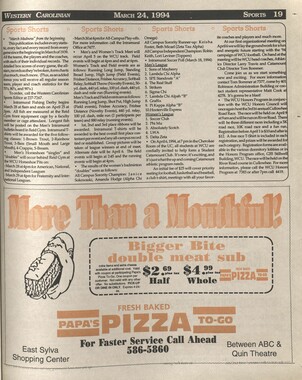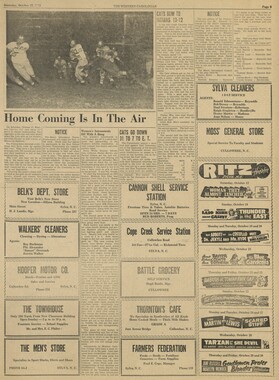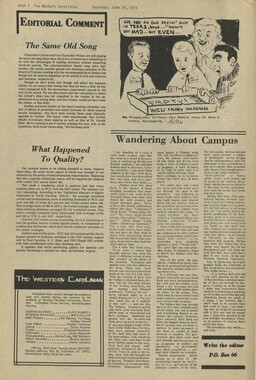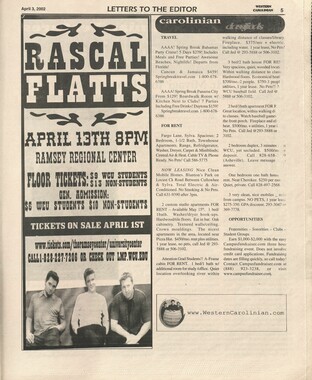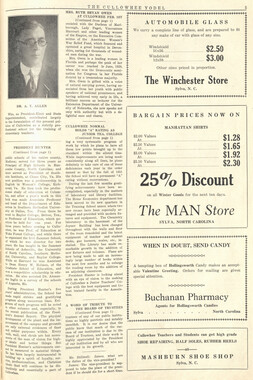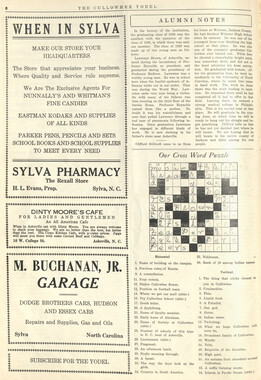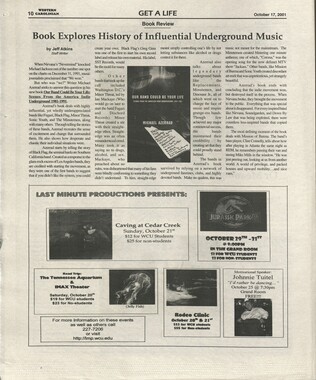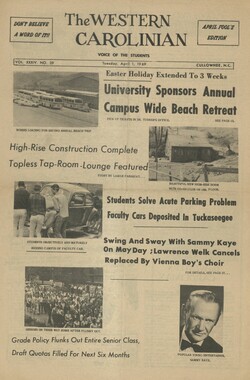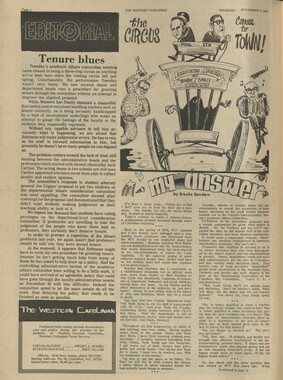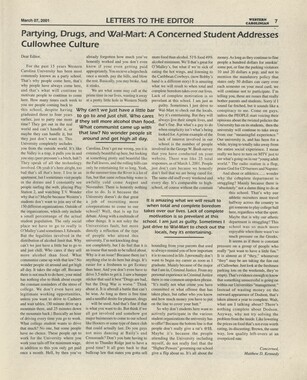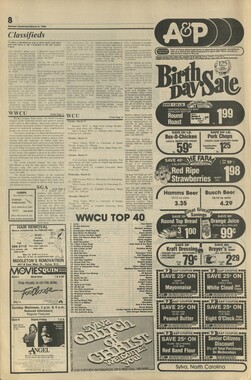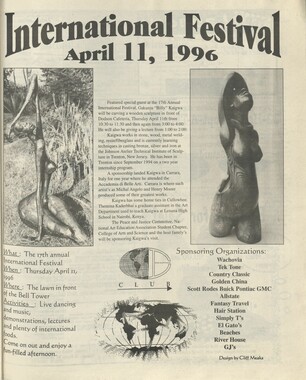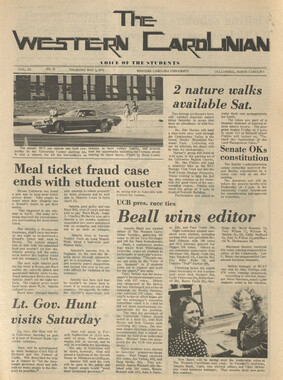Western Carolina University (20)
View all
- Canton Champion Fibre Company (2308)
- Cherokee Traditions (293)
- Civil War in Southern Appalachia (165)
- Craft Revival (1942)
- Great Smoky Mountains - A Park for America (2767)
- Highlights from Western Carolina University (430)
- Horace Kephart (941)
- Journeys Through Jackson (154)
- LGBTQIA+ Archive of Jackson County (24)
- Oral Histories of Western North Carolina (314)
- Picturing Appalachia (6772)
- Stories of Mountain Folk (413)
- Travel Western North Carolina (160)
- Western Carolina University Fine Art Museum Vitreograph Collection (129)
- Western Carolina University Herbarium (92)
- Western Carolina University: Making Memories (708)
- Western Carolina University Publications (2283)
- Western Carolina University Restricted Electronic Theses and Dissertations (146)
- Western North Carolina Regional Maps (71)
- World War II in Southern Appalachia (131)
University of North Carolina Asheville (6)
View all
- Allanstand Cottage Industries (62)
- Appalachian National Park Association (53)
- Bennett, Kelly, 1890-1974 (1388)
- Berry, Walter (76)
- Brasstown Carvers (40)
- Carver, George Washington, 1864?-1943 (26)
- Cathey, Joseph, 1803-1874 (1)
- Champion Fibre Company (233)
- Champion Paper and Fibre Company (297)
- Cherokee Indian Fair Association (16)
- Cherokee Language Program (22)
- Crowe, Amanda (40)
- Edmonston, Thomas Benton, 1842-1907 (7)
- Ensley, A. L. (Abraham Lincoln), 1865-1948 (275)
- Fromer, Irving Rhodes, 1913-1994 (70)
- George Butz (BFS 1907) (46)
- Goodrich, Frances Louisa (120)
- Grant, George Alexander, 1891-1964 (96)
- Heard, Marian Gladys (60)
- Kephart, Calvin, 1883-1969 (15)
- Kephart, Horace, 1862-1931 (313)
- Kephart, Laura, 1862-1954 (39)
- Laney, Gideon Thomas, 1889-1976 (439)
- Masa, George, 1881-1933 (61)
- McElhinney, William Julian, 1896-1953 (44)
- Niggli, Josephina, 1910-1983 (10)
- North Carolina Park Commission (105)
- Osborne, Kezia Stradley (9)
- Owens, Samuel Robert, 1918-1995 (11)
- Penland Weavers and Potters (36)
- Roberts, Vivienne (15)
- Roth, Albert, 1890-1974 (142)
- Schenck, Carl Alwin, 1868-1955 (1)
- Sherrill's Photography Studio (2565)
- Southern Highland Handicraft Guild (127)
- Southern Highlanders, Inc. (71)
- Stalcup, Jesse Bryson (46)
- Stearns, I. K. (213)
- Thompson, James Edward, 1880-1976 (226)
- United States. Indian Arts and Crafts Board (130)
- USFS (683)
- Vance, Zebulon Baird, 1830-1894 (1)
- Weaver, Zebulon, 1872-1948 (58)
- Western Carolina College (230)
- Western Carolina Teachers College (282)
- Western Carolina University (1794)
- Western Carolina University. Mountain Heritage Center (18)
- Whitman, Walt, 1819-1892 (10)
- Wilburn, Hiram Coleman, 1880-1967 (73)
- Williams, Isadora (3)
- Cain, Doreyl Ammons (0)
- Crittenden, Lorraine (0)
- Rhodes, Judy (0)
- Smith, Edward Clark (0)
- Appalachian Region, Southern (2393)
- Asheville (N.C.) (1887)
- Avery County (N.C.) (26)
- Blount County (Tenn.) (161)
- Buncombe County (N.C.) (1664)
- Cherokee County (N.C.) (283)
- Clay County (N.C.) (555)
- Graham County (N.C.) (233)
- Great Smoky Mountains National Park (N.C. and Tenn.) (505)
- Haywood County (N.C.) (3522)
- Henderson County (N.C.) (70)
- Jackson County (N.C.) (4692)
- Knox County (Tenn.) (25)
- Knoxville (Tenn.) (12)
- Lake Santeetlah (N.C.) (10)
- Macon County (N.C.) (420)
- Madison County (N.C.) (211)
- McDowell County (N.C.) (39)
- Mitchell County (N.C.) (132)
- Polk County (N.C.) (35)
- Qualla Boundary (981)
- Rutherford County (N.C.) (76)
- Swain County (N.C.) (2113)
- Transylvania County (N.C.) (247)
- Watauga County (N.C.) (12)
- Waynesville (N.C.) (68)
- Yancey County (N.C.) (72)
- Aerial Photographs (3)
- Aerial Views (60)
- Albums (books) (4)
- Articles (1)
- Artifacts (object Genre) (228)
- Bibliographies (1)
- Biography (general Genre) (2)
- Cards (information Artifacts) (38)
- Clippings (information Artifacts) (191)
- Crafts (art Genres) (622)
- Depictions (visual Works) (21)
- Design Drawings (1)
- Drawings (visual Works) (184)
- Envelopes (73)
- Facsimiles (reproductions) (1)
- Fiction (general Genre) (4)
- Financial Records (12)
- Fliers (printed Matter) (67)
- Glass Plate Negatives (381)
- Guidebooks (2)
- Internegatives (10)
- Interviews (811)
- Land Surveys (102)
- Letters (correspondence) (1013)
- Manuscripts (documents) (619)
- Maps (documents) (174)
- Memorandums (25)
- Minutes (administrative Records) (59)
- Negatives (photographs) (5835)
- Newsletters (1285)
- Newspapers (2)
- Occupation Currency (1)
- Paintings (visual Works) (1)
- Pen And Ink Drawings (1)
- Periodicals (193)
- Personal Narratives (7)
- Photographs (12976)
- Plans (maps) (1)
- Poetry (7)
- Portraits (1802)
- Postcards (329)
- Programs (documents) (151)
- Publications (documents) (2237)
- Questionnaires (65)
- Scrapbooks (282)
- Sheet Music (1)
- Slides (photographs) (402)
- Sound Recordings (796)
- Specimens (92)
- Speeches (documents) (15)
- Tintypes (photographs) (8)
- Transcripts (322)
- Video Recordings (physical Artifacts) (23)
- Vitreographs (129)
- Text Messages (0)
- A.L. Ensley Collection (275)
- Appalachian Industrial School Records (7)
- Appalachian National Park Association Records (336)
- Axley-Meroney Collection (2)
- Bayard Wootten Photograph Collection (20)
- Bethel Rural Community Organization Collection (7)
- Blumer Collection (5)
- C.W. Slagle Collection (20)
- Canton Area Historical Museum (2110)
- Carlos C. Campbell Collection (282)
- Cataloochee History Project (65)
- Cherokee Studies Collection (4)
- Daisy Dame Photograph Album (5)
- Daniel Boone VI Collection (1)
- Doris Ulmann Photograph Collection (112)
- Elizabeth H. Lasley Collection (1)
- Elizabeth Woolworth Szold Fleharty Collection (4)
- Frank Fry Collection (95)
- George Masa Collection (173)
- Gideon Laney Collection (452)
- Hazel Scarborough Collection (2)
- Hiram C. Wilburn Papers (28)
- Historic Photographs Collection (236)
- Horace Kephart Collection (861)
- Humbard Collection (33)
- Hunter and Weaver Families Collection (1)
- I. D. Blumenthal Collection (4)
- Isadora Williams Collection (4)
- Jesse Bryson Stalcup Collection (47)
- Jim Thompson Collection (224)
- John B. Battle Collection (7)
- John C. Campbell Folk School Records (80)
- John Parris Collection (6)
- Judaculla Rock project (2)
- Kelly Bennett Collection (1407)
- Love Family Papers (11)
- Major Wiley Parris Civil War Letters (3)
- Map Collection (12)
- McFee-Misemer Civil War Letters (34)
- Mountain Heritage Center Collection (4)
- Norburn - Robertson - Thomson Families Collection (44)
- Pauline Hood Collection (7)
- Pre-Guild Collection (2)
- Qualla Arts and Crafts Mutual Collection (12)
- R.A. Romanes Collection (681)
- Rosser H. Taylor Collection (1)
- Samuel Robert Owens Collection (94)
- Sara Madison Collection (144)
- Sherrill Studio Photo Collection (2558)
- Smoky Mountains Hiking Club Collection (616)
- Stories of Mountain Folk - Radio Programs (374)
- The Reporter, Western Carolina University (510)
- Venoy and Elizabeth Reed Collection (16)
- WCU Gender and Sexuality Oral History Project (32)
- WCU Mountain Heritage Center Oral Histories (25)
- WCU Oral History Collection - Mountain People, Mountain Lives (71)
- WCU Students Newspapers Collection (1744)
- Western North Carolina Tomorrow Black Oral History Project (69)
- William Williams Stringfield Collection (2)
- Zebulon Weaver Collection (109)
- African Americans (390)
- Appalachian Trail (35)
- Artisans (521)
- Cherokee art (84)
- Cherokee artists -- North Carolina (10)
- Cherokee language (21)
- Cherokee pottery (101)
- Cherokee women (208)
- Church buildings (167)
- Civilian Conservation Corps (U.S.) (110)
- College student newspapers and periodicals (1830)
- Dams (103)
- Dance (1023)
- Education (222)
- Floods (61)
- Folk music (1015)
- Forced removal, 1813-1903 (2)
- Forest conservation (220)
- Forests and forestry (917)
- Gender nonconformity (4)
- Great Smoky Mountains National Park (N.C. and Tenn.) (181)
- Hunting (38)
- Landscape photography (10)
- Logging (103)
- Maps (84)
- Mines and mineral resources (8)
- North Carolina -- Maps (18)
- Paper industry (38)
- Postcards (255)
- Pottery (135)
- Railroad trains (71)
- Rural electrification -- North Carolina, Western (3)
- School integration -- Southern States (2)
- Segregation -- North Carolina, Western (5)
- Slavery (5)
- Sports (452)
- Storytelling (245)
- Waterfalls -- Great Smoky Mountains (N.C. and Tenn.) (66)
- Weaving -- Appalachian Region, Southern (280)
- Wood-carving -- Appalachian Region, Southern (328)
- World War, 1939-1945 (173)
The Reporter, March 1977
-
The Reporter is a publication produced by Western Carolina University featuring news, events, and campus community updates for faculty and staff. The publication began in August of 1970 and continues digitally today. Click on the link in the “Related Mate
-
-
The Reporter A Weekly Newsletter for the Faculty and Staff of Western Carolina University * Cullowhee, N. C. » M arch 2, 1977 MOORE HALL RENOVATION PLANNED Plans are currently underway for the renovation of Moore Hall. Jackson, Padgett and Freeman, Architects, have completed the design for the renovation and bids are expected to be received in late March or early April. Construction will be completed within six to seven months after contracts have been awarded. General repairs will include steam cleaning of the exterior of the building and roof repair; replacement of the plumbing, heating, and lighting systems and replacement of major portions of the electrical system; and installation of a new passenger elevator. The building will also be upgraded to facilitate use by the handicapped. The well-known parlor will be restored and used as a multipurpose room and the patio will be improved. The School of Nursing and Health Sciences will occupy the first and second floors. The Credit Union will remain in the building until other quarters become available and the radio station will continue to be housed in the basement. After renovation of the first and second floors, there will be eight classrooms, 28 offices, and four laboratories as well as the multipurpose room, a reception room and a workroom. Dependent upon the bids, the basement and fourth floors may also be renovated, creating seven more classrooms and 36 offices. DR. HEAD PUBLISHES THIRD BOOK "Imperial Twilight," the third volume in the field of Byzantine history by WCU professor Constance Head, has just been published by Nelson- Hall, Inc. of Chicago. Sub-titled "The Palaiologos Dynasty and the Decline of Byzantium," the 210-page volume traces the history of the last ten Byzantine emperors, all but one of whom bore the surname Palaiologos. The book begins with the accession of Michael VIII in 1258 and ends with the death of Constantine XI, who was killed in battle when the Turks captured Constantinople in 1453 and brought an end to the Byzantine Empire. It follows on the heels of Dr. Head's "The Emperor Julian," published in Boston last year in the Twayne World Leaders series by G. K. Hall. Julian was the third Byzantine emperor, and ruled in the fourth century, while "Imperial Twilight" shifts the emphasis to a much later oeriod in Bvzantine history. Dr. Head's first book, published in 1972 by the University of Wisconsin Press, is "Justinian the Second of Byzantium," a biographical study of the son of Constantine IV who ruled in the seventh and eighth centuries. Dr. Head is a graduate of Duke University from which she holds master's and doctoral degrees. She joined the WCU faculty in 1967. In addition to her three books, Dr. Head has published a dozen scholarly articles and numerous reviews on both Byzantine and British history. During 1972-73 she was the recipient of a Younger Humanists Fellowship from the National Endowment for the Humanities. She is a member of the National Organization of American Byzantinists and serves as treasurer of the local chapter of the American Association of University Women. DIETICIAN JOINS HOME EC FACULTY Dr. Barbara A. Cosper, a registered dietician and native of Alabama, has joined the WCU faculty as associate professor of home economics and coordinator of WCU's programs in food, nutrition and dietetics. Her appointment, announced by Dr. Wilma B. Cosper, head of the Department of Home Economics and no relation to the new professor, helps fill a gap in WNC educational opportunities. A report of the American Dietetic Association confirms the non-existence of recognized dietetics programs in this part of the state. A graduate of the University of Alabama, from which she holds both bachelor's and master's deqrees, Dr. Cosper holds the Ph.D. from Kansas State University. She comes to WCU from four years' teaching at Texas Tech University, and formerly taught at Kansas State University and at Middle Tennessee State University. Last summer she served as a WCU visiting professor to Jamaica. Dr. Cosper's research interests include nutrition education and the food choices of people, and she has published scholarly articles in the Journal of the American Dietetic Association and the Journal of School Health on these subjects. She has served as a dietetic consultant to colleges and hospitals and to Minit Burger Corporation of Nashville, Tenn., and she has been an invited speaker on the treatment of obesity and inter-relations between stress and food intake patterns. Dr. Cosper is a member of the ADA, the American Home Economics Association, the New York Academy of Science, the American Public Health Association, and the Nutrition Today Society. She is listed in "Outstanding Young Women of America, 1976" and "Personalities of the South, 1976." At Texas Tech she was a recipient of a New Faculty Excellence in Teaching Award (1975) and a semi-finalist for the 1976 Woman of the Year Award. PLACEMENT SERVICES HELP STUDENTS Job hunting in today's economy is a tough task, especially for college seniors with no previous work experience. But at Western Carolina University, there are several people who make it a little easier. They are the folks in the Placement Office, which is located within the larger Counseling, Advisement, and Placement (CAP) Center, and the Teacher Placement Service in the School of Education and Psychology. Their job, as Placement Coordinator Larry Bixby says, is to provide any service to help WCU graduates find jobs. And that is a herculean task indeed when one considers that more than 1,000 people earn their sheepskins from WCU each year. Because it can take from six to nine months for a student occupied with schoolwork to find a job, the placement team begins early each year educating upperclassmen on the fine points of the task. One of the newest ways the team has come up with is a series of mini-courses. Each mini-course lasts less than an hour but provides seniors with the information they need to begin the task of job hunting. The sessions teach students how to identify potential employers, how to contact them, how to sell their skills to potential employers, and how to write resumes and the various kinds of letters needed in the job hunt. Are the courses successful? Catherine Crawford, a recent WCU graduate in home economics, thinks so. They've been a big help," she said. "They have shown me a lot of things most people just don't know about job hunting." Mini-courses are not the only things WCU does to help graduates make the transition from academic life to life in business and industry. There are sound and slide shows instructing WCU students how to be better job hunters. There is also a career opportunities library at the Placement Office, and a campuswide Career Day when representatives of business and industry, government and education, visit WCU to discuss job opportunities in their fields. The Teacher Placement Service, directed by Dr. Ben Battle, each year finds jobs for more than 200 teachers who graduate from WCU. Dr. Battle's office maintains close contact with school systems throughout North Carolina and the Southeast. Prospective teachers, as other job hunters do at the Placement Center, keep a folder on file at the Teacher Placement Office and when school personnel officers call for a teacher trained in a specific area, the information is immediately available. The Teacher Placement Office also maintains a teacher availability directory, which lists those graduates of WCU who are available for work, their specialty, and how they may be contacted. This directory is furnished to all school systems in the Southeast. Although job hunting is a stony path to tread, Bixby's and Battle's staffs make it easier. And as Bixby says, "We can't walk the road for the students, but we can certainly make it a little smoother." 49 GRADUATE COURSES SET THIS SPRING Forty-nine graduate-level evening and Saturday classes will be offered on the Western Carolina University campus spring quarter beginning Saturday, March 19. Persons interested in the night classes may register in person by seeing academic advisers March 16-26 or on other dates by appointment before the registration deadline March 26. The registrar's, accounting, and Graduate School offices are open to assist with registration and payment of fees from 8 a.m. until 5 p.m. Mondays through Fridays and from 9 a.m. to 12 noon Saturday, March 26. Persons may be accepted for enrollment in the Saturday and evening class program during the late registration period providing class space is available, they have attended the first class session, and registration, including payment of fees, is completed by March 26. A complete listing of the classes and their meeting times is available from the Graduate School office. A photographic competition for students in North Carolina colleges, universities and technical institutes and adults in community art or photography programs will be held at Western Carolina University this spring. Deadline for entries, which may be black and white, color, or experimental, is March 25. Each photographer may submit up to five prints, and there is a $2 entry fee per print. The exhibit will be selected and judged by Sam Wang, professor of photography at Clemson University. Selected photographs will be displayed in the first annual North Carolina student photography exhibit, to be shown at WCU May 1-12. First award in the competition is a $50 prize. Second and third awards include photographic gift certificates and merchandise, and honorable mentions include photo books. Further information and entry forms are available from the WCU Department of Art, telephone 293-7210. SKI TRIP STILL HAS THREE OPENINGS A cross-country skiing trip to the rugged White Mountains of New Hampshire will be sponsored March 13- 20 by the University Center. According to UC program director Tim Jacobs, participants will spend four nights sleeping in sleeping bags and preparing their own meals in a heated mountain hut accessible only on skis. Jacobs had some advice for prospective trippers. "Expect to help with the cooking and dishwashing," he said. "Expect to go for a while without a bath or shower; expect to get tired of the long drive going up and back; most of all, expect a unique experience that promises to be a lot of fun and excitement ." Cost of the trip is $76, which includes transportation, skiing equipment, accommodations, all lunches, and meals eaten at the mountain hut. Participants will purchase their own meals en route to and from the White Mountains (a total of six meals). The trip will be guided by Cullowhee Wilderness Outfitters. Further information is available from Jacobs at the University Center, telephone 293-7205. WOMEN'S FAIR TO BE HELD HERE Two Jackson County women, one of them an English professor at Western Carolina University, have received a grant to support a pilot "women's fair" next fall. Dr. Nancy Joyner, associate professor of English at WCU, and Mrs. Veronica Nicholas have received a $1,290 grant from the North Carolina Humanities Committee to support the one-day forum which will feature women-oriented music, crafts, and speakers. According to the grant proposal, entitled "The Quilting Bee: Jackson County Women in Transition," the long-range purpose of the fair is "to bring the diverse communities of county and town together." The fair, in addition to displaying various aspects of women's skills like baking and sewing, will feature the Mountain Women's Cooperative Band, a string band composed solely of mountain women. The fair also will feature films, a panel discussion, and speakers including Dr. Jacqueline Hall, director of the Southern Oral History Program at Chapel Hill, and Dr. Grace Rohrer, former secretary of the N. C. Department of Cultural Resources. STUDENT ART ON DISPLAY AT UC Jewelry, prints, weaving, glass, pottery and paintings by four WCU students—Judy Co-lier, Joani DiGiovanni, Claudia Leah Kleinhans and Karen Stinnett—are featured in the current exhibition at the Chelsea Gallery in Hinds University Center. The exhibition, which is free to the public, will remain on display through March 11. VISITING SCHOLARS TO SPEAK Dr. Frances Fox Piven, political scientist and urban planner, will lecture and hold a seminar in social work and field practice Thursday, March 3, under the sponsorship of the WCU Visiting Scholars Program and the Social Work Area. Dr. Piven, presently a member of the Political Science Department at Boston University, will speak at 8:15 p.m. Thursday (Mar. 3) in Forsyth Auditorium on "Social Welfare in the Seventies: The Victims and Villains of Crisis Politics." The seminar, open to social work students, their field supervisors and other interested persons, will be held at 2 p.m. in the Cherokee Room of Hinds University Center. The seminar theme is "Social Action and Strategies and Role Dilemmas of the Professional." Dr. Piven holds the B.A., M.A. and Ph.D. degrees from the University of Chicago. She has had post doctorate fellowships and grants from the Ford Foundation Study Grant and Metropolitan Research Center of Columbia University, Gugenheim fellowship . She is the senior author of two books on welfare policies in the present decade, "Regulating the Poor" and "Poor People's Movement and Why They Fail," and "The Urban Crisis, Who Got Waht and Why," and numerous articles. A research physiologist will lecture at WCU Thursday and Friday, March 3-4. Dr. Birgit Satir, a research physiologist in the department of physiology-ahatomy at the University of California at Berkeley, will give a public lecture on "The Final Steps in Secretion" at 8 p.m. Thursday (Mar. 3) in Room 146, Stillwell Science Building. At 12 noon on Friday, Dr. Satir will speak to students and faculty in Room 3, Stillwell, on "Membrane Events in Secretion." A native of Denmark, Dr. Satir received the Ph.D. degree in biochemistry from the University of Copenhagen in 1961. She came to the United States in 1962 when she married Peter Satir, a cell biologist at Berkeley. A REMINDER The Student Government Association will host an open house for all faculty members from 3 until 5 p.m. Wednesday, March 23, the first week of classes. The SGA offices are located on the second floor of A. K. Hinds University Center. The Reporter A W eekly Newsletter for the Faculty and Staff of Western Carolina University/Cullowhee,N.C./March 9,1977 DR. ROBINSON TESTIFIES BEFORE SENATE AGRICULTURE COMMITTEE Chancellor H. F. Robinson Monday told the Senate Agriculture Committee chaired by Sen. Herman Talmadgev D-Ga., that major agricultural legislation pending in Congress should be changed to extend federally Sf nsored research funds to non-landgrant colleges and universities. He appeared as the representative of the American Association of State Colleges and Universities, one of the major national educational organizations with 323 member institutions. Dr. Robinson is chairman of the AASCU's Committee on Agriculture. Dr. Robinson said such AASCU members as WCU, Appalachian State, UNC-Charlotte, East Carolina, N. C. Central, and Fayetteville State "have in the past and will in the future contribute greatly to the improvement of our agricultural production and to the preservation and appropriate use of our natural resources. " The hearing Monday was held on a bill introduced by Sen. Talmadge, the Food and Agriculture Act of 1977. Later this month Dr. Robinson will testify before House committees considering similar legislation. All of the agriculture bills are aimed at greatly increasing the national commitment to agricultural research, but all in their present form would limit the allocation of research funds to land-grant colleges and universities. Dr. Robinson told the Senate committee that AASCU is asking "that care be taken in the drafting of this legislation to insure that all possible talents represented in the institutions of higher learning, particularly those in the American Association of State Colleges and Universities, not only be allowed to participate hit that they be solicited. "We also ask that the resources provided by this legislation be made available to those individuals and those institutions where there is talent that can be utilized to insure that your objectives be realized in expanding the effectiveness of agricultural research and education." Dr. Robinson told the committee that some of the nation's foremost leaders in research and education in the fields of agriculture and related areas have come from regional state colleges and universities as well as from the land-grant institutions established primarily for as agricultural training institutions. He-pointed out that Sarah Hardin Parker, former chief dietitian of the U. S. Military Academy at West Point; Lynn Kinkead Engstrand, one of the originators of soy bean research; and Dr. Sarah Crawford Wilson, head of the department of home economics at fowd State University, all are Apj>a-lachian State graduates. Western Carolina alumni, he noted, include Dr. Garrett Smathers, senior scientist of the National Park Service Denver Science Center; Dr. Henry L. Cox of Clearwater, Fla., retired cpneral manager of the Chemical Division and vice president of Corn Products Refining Company; Lamar Beasley, environmental coordinator for programs and legislation of the U. S. Forest Service in Washington; aid Dr. Carol Miller, former plant pathologist of the University of Florida and now director of tobacco research and production of Coker Pedigreed Steed Company. He said these persons are examples of the type of AASCU-institution graduates "who are capable of major contributions and who should be allowed to participate in the programs" shaping up under the new research bills. He said federal support'for higher education research and training in agriculture and related fields is vitally important to the development of many institutions that would be barred from participation if the bills remain unchanged. He said the "service orientation" and contribution being made ty AASCU institutions to the "basic needs of the people" varrant extension cf the benefits of the legislation to such institutions. "These institutions aid individuals represented on their faculties in agriculture and related disciplines will, in my opinion, often more appropriately and effectively contribute to the solution of international programs of research and agriculture than will individuals in the land-grant institutions." Dr. Robinson is nationally known for his work in agriculture. He was at N. C. State for more than 25 years in population and quantitative genetics work. As a consultant to the Rockefeller Foundation, he helped establish many international agricultural research programs. During President Johnson's administration, he was executive director of the President's Science Advisory Committee Panel on the World Food Supply. Currently, he is a leader in National Science Foundation and National Academy of Sciences studies on world food, population, and nutrition problems. NEW WORLD HISTORY COURSE BEING WRITTEN A $6,000 grant from the Exxon Educational Foundation is helping a WCU professor explore new and better ways to teach history. Dr. Tom E. O'Toole, WCU assistant professor of history, is using the grant to write a new course called "World History by Design." The course will consist of eight units of instruction, and should be ready for its first test when WCU begins its fall semester in August. Designed for use by 35-60 students in a class, the course will separate the students into smaller groups to teach them the problem-solving method, which Dr. 0'Toole says lies at the core of the historical method. Students are given a problem and are encouraged to seek materials that might lead them to possible solutions. When the group reaches a decision, it is given additional feedback from the instructor from which the students can further refine their solution. The first unit, "Thinking Clearly About World History," serves as an introduction to the decision-making process, the "Guided Design" systems approach and world history as a field of study. Six historical projects follow, and the course concludes with a final project intended to summarize the semester's learning. The system treats historical facts, concepts and generalizations as part of the background information required for the decision-making process, Dr. O'Toole said. Students are expected to learn the historical content they need on their own, outside of class. The ultimate goal is to teach the student how to think. "Initially, the idea of independent problem-solving poses a threat to some students," Dr. O'Toole said. "Guided design offers all students a chance to learn to think for themselves rather than just memorize facts." Dr. 0'Toole's course is based on the "Guided Design" concept developed by Dr. Charles E. Wales of West Virginia University and Dr. Robert H. Stager of the University of Windsor in Canada. "Guided Design" is similar to a program known to many teachers as the personalized system of instruction, but adds the extra dimension of peer interaction since it is intended for use by a group. Dr. O'Toole first joined the WCU faculty in 1972. He is a graduate of St. Mary's College and the University of Minnesota, and holds the doctoral degree from Carnegie-Mellon University. He teaches courses in world civilization, introduction to social science, and African history. PLANNING MEETINGS TO BE HELD A series of 14 community planning meetings, part of a regionwide effort to involve the human element in the planning process, began this week with meetings in Sylva and Franklin. ( Over ) The meetings are part of a proWCU'S ONLY MALE SECRETARY MAY BE FIRST EVER HERE ject called "The State of Franklin: Planning for Tomorrow." They are being coordinated ly WCU's Division of Continuing Education, operating under a $4,000 grant from the N. C. Humanities Committee. The Sylva meeting was held Monday and included participation by Dr. Richard Berne, WCU associate professor of science education; Ned Tucker, director of the Jackson County Planning Board; and Dr. D. C. Sossomon, WCU professor of history. The Franklin meeting will be held Thursday (Mar. 10) at 7 p.m. in the Macon County Courth<ise. Participants include Robert Carpenter, president of the Macon County Planning Board, Dr. John Bunn, pastor of First Baptist Church in Sylva, and Dr. Gerald Eller, WCU professor of biology. The format for each meeting will devote one hour to formal presentations by the panelists, with a second hour open to questions from the floor. Other meetings will begin at 7 p.m., with dates and places as follows: Mar. 14, Haywood County Courthouse; Mar. 17, Bryson City community auditorium; Mar. 28, Graham County Courthouse; Mar. 31, Clay County Courthouse; Apr. 4, Blue Ridge School, Glenville; Apr. 7, Highlands High School; Apr. 18, Canton Municipal Building; Apr. 21, Alarka Elementary School; Apr. 28, Andrews High School; May 2, Clay County Courthouse; and May 9, Stecoah High School. A second meeting in Cherokee County will be scheduled later. Other WCU people involved include Dr. John Bennett, professor of philosophy, and Dr. J. Karl Nicholas, assistant professor of English. The project is intended to add a human dimension to the technical and scientific data already gathered by regional planners. HIGH SCHOOL ART EXHIBIT IN PROGRESS Ten WNC high school students have received awards and honorable mentions in WCU1s annual high school art exhibition, now on display in the art gallery in Carol Grotnes Belk Building. The exhibit, which is sponsored by the Department of Art, includes 119 separate works from 11 WNC high schools. Schools represented in the show are A. C. Reynolds, Asheville, Brevard, Cullowhee, Franklin, Swain County, Edneyville, Pisgah, McDowell, Rosman, and Sylva-Webster. The exhibit will remain on display through March 18. Gallery hours are 8 a.m. until noon and 1-4 p.m. Monday through Friday and 2-4 p.m. on Sunday. LIBRARY SEARCH REOPENED The search Tor a university librarian has been reopened by th e Librarian Advisory Committee under the chairmanship of Dr. Aaron Hyatt, dean of the Graduate School. All faculty members have been urged to make suggestions of possible candi- . dates to the commtiete. The com- * i mittee will continue to receive applications until April 15, 1977. Names and addresses of prospective candidates should be forwarded to Dean Hyatt. You hear a lot these days about women working in traditionally male jobs, but in the case of the secretary at WCU's newest undergraduate school, the shoe is on the other foot. And it's a size 12 foot, at that. The foot belongs to David Joe Sanders, a six-foot-one, 180-pound Sylva native who may be the first male secretary in WCU's 87-year history. Since November, Sanders has been the secretary to Dr. Walter Thomas, dean of the School of Technology and Applied Science. He was chosen for the position, classified by the state as a "Secretary IV," from a field of six applicants, all the rest female. Why did he do it? "This area is home to me," the 30-year-old Navy veteran said, "and I was looking for a job that would enable me to live here. When this one came up, I applied for it because I knew I could do the work." Sanders, who expects to receive a WCU degree this summer with a major in English and a minor in speech and theatre arts, qualified for the job by passing the N. C. standardized typing test with flying colors. His first task involved setting up the office from scratch following the establishment of the school last fall. His experience as a student worker in several WCU offices proved helpful, as did the business curriculum courses he took as a student at Swain County High School. How does he like the work? "This is really a people-oriented job," he said, "and I like that. There's plenty of variety, too, since our office administers the departments of home economics and industrial technology. " Sanders, who has seen his poems published and his dramatic scripts produced on the stage, thinks of himself first as a poet and writer. He admits that his long-range career goals do not include secretarial work. "But just because this is a bread-and-butter job doesn't mean that I'm not going to do it as well as I can," he said. "I'm certainly not going to do any job half-heartedly." His boss substantiates that claim. "Joe's one of the best secretaries I've ever had," Dean Thomas said. "He has a lot of initiative coupled with an exceptionally broad background, and he really gets the job done." How do other people react to a male secretary? "There's been a fair amount of humorous comment," Sanders said. "Every time I go to one office on campus, a lady there teases me about not wearing a skirt. And Dean Thomas says I'm the first secretary he's ever had that he can have lunch with without his wife getting upset." Basically, he said, people regard him as an oddity, but he hasn't caused any real stir. "When people come into the office," he said, "I think I try harder to put them at ease because I have long hair and a beard." Sanders doesn't regard himself as a strong women's libber, but he does believe in equal pay for equal work, and he doesn't think women—or men—should be channeled into certain fields just because of their sex. "We've come full circle," Sanders said. "Up until about a hundred years ago all secretarial help was male. I'm just working in that tradition." Sanders even plans to join the local chapter of the North Carolina Association of Educational Office Personnel, to date an all-female organization. "When I visited at their last meeting," he said, "the ladies were all ve^y kind to me." AUDITIONS FOR "CABARET" SCHEDULED Auditions for the WCU production of the musical "Cabaret" will be held March 21 at 6:30 p.m. in Hoey Auditorium. The additions will be divided into acting, musical and dance auditions. No prepared audition is required for the acting section, as selected passages from the script will be used. For the musical section, prospective cast members should bring the music for two numbers, one slow and one upbeat. The music selected should not be taken from the show. Dance auditioners should wear comfortable clothing they can move in, such as leotards and tights. They will be required to follow a simple step, and previous training is not mandatory. Copies of the script are available on loan from the Department of Speech and Theatre Arts in room 123 of Stillwell Science Building. Further information is available from Jeanne Murphy, instructor of speech and theatre arts. The show calls for 19 females and 17 males. It will be staged here May 19-21. WCU'S MAN IN N.Z.: A STATUS REPORT Dr. James W. Wallace, WCU associate professor of biology, is one of three scientists awarded senior research fellowships this year by the New Zealand National Research Advisory Council, the equivalent of the U. S. National Sfcience Foundation. Dr. Vfellace is spending this year at Petone, New Zealand, where he is attached to the natural products section of the New Zealand Department of Scientific and Industrial Research. His research centers on the chemistry and function of plant phe-nolics, especially flavonoids and lignin. (Lignin is a pulp and paper by-product which, in nature, is responsible for making wood hard.) As part of his work, Dr. Wallace served as chairman of a natural product chemistry session of a meeting of the International Union of Pure and Applied Chemistry at Dunedin, N. Z. He also has presented seminars at the Wellington Botanical Society and Victoria University, both in New Zealand, the University of New South Wales in Australia, and the University of the South Pacific at Fiji. The Reporter A Weekly Newsletter for the Faculty and Staff of Western Carolina University/Cullowhee, N.C./ March 23, 1977 STUDENTS TO STUDY NEW YORK FASHIONS Two Western Carolina University students will get an inside look at the New York fashion world this week and next as part of a WCU course in fashion merchandising. Tye Penley of Asheville, a WCU junior, and Julie Ladet of Canton, a sophomore, will visit New York March 24-31 with Joyce Shaw, WCU assistant professor of home economics. Among the places they will tour are the offices of Fashion Magazine, the historic costume collection at the Metropolitan Museum, and the Fashion Institute of Technology. They also will visit a clothing manufacturing showroom, a buying office, a fashion designer showroom, a pattern company, a fashion advertising agency, and several nationally known retail stores. The WCU group will join a larger group from the merchandising program at Cleveland County Technical Institute for the tour, which will count toward college credit for the course, Principles and Techniques of Fashion Merchandising. Other requirements of the course will include reading assignments and class presentations. TRUSTEES APPROVE ALUMNI APPOINTMENT The Western Carolina University Board of Trustees at its March 9 meeting approved the appointment of a new director of alumni affairs and heard reports on a proposed reorganization of the WCU School of Education and Psychology and the status of two other undergraduate schools. Arthur J. Manring, formerly a small business management consultant in WCU's Center for Improving Mountain Living, was named to the alumni post. A native of High Point, Manring was graduated from WCU in 1974 with the bachelor of science in business administration degree. He later earned the master of business administration degree, also from WCU. •A U.S. Army veteran, Manring served for two-and-one-half years with what was then the Economic Development Center at WCU. Dr. Betty Siegel, dean of the School of Education and Psychology, told board members the proposed reorganization in her school grew out of a desire "to perpetuate Western Carolina University's proud tradition" in teacher education. Part of a six-month teacher education review throughout the University of North Carolina system, the WCU proposal would create a new Department of Human Services. The new department would administer WCU's programs in counseling, mental retardation, learning disabilities, speech and hearing, and gifted and talented education, as well as Project Early Bird, WCU's summer program for prospective college students who are visually impaired. The present departments of administration and school personnel and curriculum and instruction would be merged under the proposal, and the Department of Elementary Education would add the words "and Reading" to its title to reflect WCU's increasing emphasis on the teaching of reading. The Department of Psychology and the Department of Health, Physical Education and Recreation would remain unchanged. Three new positions would be created under the reorganization. A coordinator of special services would oversee WCU's Bureau of School Services, student teaching and placement, international programs, and special summer programs. A director of research and development within the school would take charge of grant proposals, special studies (including accreditation studies), position papers, research, and program development. Also, a director of clinical services would serve as liaison between the new Department of Human Services and WCU's two principal clinic services, the Developmental Evaluation Center and the Speech and Hearing Center. In other business, the board heard status reports from Dr. Frank M. Ganis and Dr. Walter E. Thomas, deans of the schools of nursing and health sciences and technology and applied science, respectively, and from Kenneth Wood, director of institutional studies and planning. Student body president Walton Teague spoke of progress made by the Student Government Association, and WCU Chancellor H. F. Robinson reported to the board on his testimony Monday before the U.S. Senate Agriculture Committee. The next board meeting was set for June 2. APRIL 11 IS GRANT PROPOSAL DEADLINE The deadline for Instructional Improvement Grant proposals—April 11— is nearing, and this year up to four grants could be awarded. The maximum amount of each grant is $1,500 and grants will be awarded on a competitive basis. Each proposal will be evaluated by a faculty/student committee named by Vice Chancellor Robert E. Stoltz. Dr. Stoltz said the purpose of the grants is to improve the quality or effectiveness of instruction within a single course or group of related courses. Proposals may be submitted by an individual faculty member or by faculty members working as a group. Interdisciplinary proposals are encouraged, he said. According to the guidelines, which are available from department heads, an individual faculty member may submit or be identified with only one proposal. The proposals should be no more than five pages long, including the budget. Specific details are available in the guidelines. Proposals should carry the endorsement of the department head and approval of the dean of the school. FOUR VISITING SCHOLARS TO SPEAK The coming week is a busy one for the WCU Visiting Scholars Program, which will co-sponsor four visits with the departments of art, earth sciences and mathematics. Visiting the art department will be Toshiko Takaezu, a potter of international reputation, who will present a lecture and pottery demonstration at 7 p.m. Thursday, March 24, in 104 Belk Building. She also will be available that afternoon and on Friday, March 25, for studio visits with art students and faculty. Presently teaching at Princeton University, she also serves as visiting lecturer at Penland School of Crafts, near Spruce Pine. The mathematics department will present Allen J. Rose, vice-president and technical director of Scientific Time Sharing Corporation, who will speak on "I Don't Like All Those Funny Looking Symbols" at 4 p.m. Friday, March 25, in Room 309 Stillwell Building. Rose is recognized as an international expert in A Programming Language (APL) and time-sharing computer service. He is the co-author with Leonard Gilman of "APL—An Interactive Approach" and has been selected as a national lecturer for the Association of Computing Machinery for two years. The earth sciences department will present lectures by Dr. Preston Cloud, emeritus professor at the University of California at Santa Barbara, and Dr. James M. Schopf, adjunct professor, Ohio State University, at 7:30 p.m. Monday, March 28, in Forsyth Auditoriwi. Dr. Cloud, foremost American authority on geological evidence of earliest life, will speak on "Early Development of Life to the Phanerozoic." He will be followed by Dr. Schopf, an authority on development of plant life on earth, speaking on "Phanerozoic Evolution of Plants." Both scholars are employes of U.S. Geological Survey and members of the Geological Society of America. FACULTY SUGGESTIONS SOLICITED The Faculty Affairs Committee is interested in receiving information from the faculty on revision of the Faculty Handbook. Suggestions on deletions, additions, corrections, removal of ambiguities, tone and style should be sent to Joe Creech in Bird Building or Ed Nelson in Forsyth Room 141. FACULTY ASSEMBLY ELECTION TO BE HELD An election for a WCU delegate and alternate delegate to the Faculty Assembly of the University of North Carolina will be held April 5. The election, to be held by the Committee on Nominations, Elections, and Committees (CONEC) , will be held under the provisions of the UNC Faculty Assembly bylaws and the WCU faculty constitution. A slate of three candidates— Ed Nelson and Leland Waters of the School of Business and Arnold Niel-son of the School of Technology and Applied Science—has been nominated by CONEC. Additional nominations in the form of a written nomination signed by at least 15 faculty members must be submitted to Gary Pool (Secretary of the Faculty) before 2 p.m. Friday, March 25. To be eligible for nomination, candidates must hold academic rank, must devote at least one-half time to teaching or other academic duties exclusive of administration, and must not be a current member of another University-wide elected committee (Chancellor's Advisory Committee, Faculty Assembly Delegation, and CONEC). The person elected will fill a three-year term. The office is currently filled by Leland Waters, whose term expires at the end of this academic year. Continuing delegates are James Horton of the School of Arts and Sciences and Guy Burchfiel of the School of Education and Psychology. FACULTY ART EXHIBIT TO OPEN An exhibition of art by members of the WCU art department faculty will open with a public reception March 28 at 7 p.m. in the art gallery of Carol Grotnes Belk Building. The exhibition will include painting and drawing by Lee Budahl, Cheryl Goldsleger, and Jim Smith? photography by Betty Al-Hamdani, Perry Kelly, and Ray Menze; pottery by Joan Byrd and David Nichols? sculpture by Bill Buchanan? and weaving by Kelly and Melissa Murray. The exhibition will remain on display through April 15. STUDENT PHOTOGRAPHS ON DISPLAY An exhibition of photographs by Student Photographic Services is now on display in the Chelsea Gallery at Hinds University Center. Photographers with work in the collection are Fred Barbour, Drew Clark, John Daughtry, Stokes Gatewood, David Lees, and Lewis Greene. All are members of Student Photographic Services, an organization of student photographers working out of the Catamount darkroom to provide photos for various publications. The exhibit will run through March 27. JUST FOR THE RECORD In the last issue of The Reporter, (March 9), a story about Joe Sanders (secretary, Technology and Applied Science) speculated that he might be the first-ever male secretary at WCU. The story prompted a call from Dr. T. Conn Bryan who served as professor of history at WCU from 1963 until his retirement in 1971. Dr. Bryan didn't have any quarrel with the story and he wasn't seeking publicity, but he did want to set the record straight. Seems that he had served as secretary to President Hunter from August, 1926, to June, 1927. That was after he was awarded his bachelor's degree from Duke University and before he launched his teaching career. Dr. Bryan recalled that another male secretary came to Western the year after he left. When told about his campus predecessors, Sanders wasn't fazed a bit. MI told you I was returning to a former tradition," he said. NAMES IN THE NEWS Retha H. Kilpatrick (Administrative Science) was the recipient of a research award given by Beta Delta Chapter of Delta Pi Epsilon, University of Georgia, at the 14th Annual Business Education Conference, February 4-5. The award is given in recognition of outstanding research in the field of Business Education. Betty Siegel (dean, Education and Psychology) was keynote speaker at the eighth annual Conference on Improvement of Instruction in Columbia, Missouri, February 4. The conference was sponsored by the Missouri State Teachers Association. Laurence French (Sociology/ Anthropology) presented a paper, "Recent Educational Progress Among the Eastern Cherokees," in the Rural Sociology Section of the annual meetings of the Southern Association of Agricultural Scientists in Atlanta Feb. 6-9. Charles M. Schneider (Health Sciences) has recently been nominated for inclusion in the first edition of Who's Who in Health Care in recognition of his position in the field of professional accomplishments. Eugene E. McDowell (head, Psychology) conducted a workshop dealing with development and learning for Jackson County Schools' volunteers Feb. 10. Clarence DelForge (Teacher Corps) attended a week-long Washington Pol.icy Seminar on educational legislation Dec. 6-10. Laurence French (Sociology/ Anthropology) presented two papers at the annual National Sociology Honor Society Research Symposium: "Appalachian Violence," in the Sociology of Violence Section; and "Correctional Sexploitation in our Nation's Prisons and Jails," in the Criminology Section. The meetings were held in Richmond, Feb. 17-19. Andrew Baggs (Political Science) is the current secretary of the North Carolina Political Science Association and editor of the association's "Newsletter," which is mailed to 65 departments throughout North Carolina. The winter edition of the "Newsletter" included a photograph of WCU in the midst of the recent snows taken by Fred Barbour, a WCU student. Betty Siegle, Tom Pickering and Clarence DelForge (Education and Psychology) attended a Teacher Corps conference on "Institutional Change" in Washington, D.C., Jan. 26-28. Tom Pickering, Nancy Sherill, Connie Hicks and Clarence DelForge attended a Teacher Corps conference on Multi-Cultural Education in Memphis, Tenn., Feb. 13-16. Charles J. Stevens, "The Use and Control of Executive Agreements: Recent Congressional Initiatives," ORBIS: A Journal of World Affairs, Vol. 20 (Winter 1977). Tom 0'Toole, a review of John Poggie Jr. and Robert N. Lynch, "Rethinking "Modernization," in Community College Social Science Journal (Spring, 1977). PUBLICATIONS Judy H. Dowell (Home Economics) recently served as one member of a three-member team representing North Carolina at a national workshop entitled "Increasing Participation of Native Americans in Vocational Education" in Dallas, Texas. Funding was provided through an EPDA grant. Larry Terango (director, Speech and Hfearing Center) will present a paper at the Council for Exceptional Children's 55th International Convention in Atlanta April 12-15. The title of his paper is "Accountability: A Microscopic View from a Speech and Hearing Center." Ray Menze (Art) will present a slide talk on "Photo History" at the opening of an exhibit of his photographs March 6 at Augusta College in Georgia. The exhibit, which includes both experimental and traditional photography, will be on display through March. The Reporter A Weekly Newsletter for the Faculty and Staff of Western Carolina University/ Cullowhee, N.C./ March 30, 1977 mssssssssi s 1976 INSTRUCTIONAL IMPROVEMENT GRANTS STILL HELPING; '77 PROPOSALS DUE What do a graphic display terminal, camping equipment, and a miscellaneous collection of plywood, nails, and boards have in common? Along with some videotape and biology lab equipment, they are all part of WCU projects or studies which resulted from the 1976 Instructional Improvement Grants. Last June six faculty members received five grants totalling $6,000 for use on projects intended to improve the quality and effectiveness of instruction in certain courses. The faculty members who received the grants are Dr. John Chapman, earth sciences; Dr. Quinn Constantz and Miss Kenyon Fairey, health and physical education; Dr. Fred Hinson, biology; Dr. John Manock, chemistry; and Dr. Judith Stillion, psychology. Dr. Manock, who is now Director of Research Administration, purchased a graphics display computer terminal. "It's up and running," he said, "and it has been used in several courses already." He explained that the terminal, which was used recently in the freshman honors chemistry course, is connected to the PDP-8 mini-computer and WCU's Xerox 560 computer. This quarter a computer graphics course will utilize the terminal, and several physics and chemistry courses will use it. But what about the boards, camping equipment and other things? The boards belong to the earth sciences department where Dr. John Chapman is currently constructing a river complete with tributaries and rapids. With student and faculty help, he is actually building a model of a real river, which will flow around bends and into and out of a lake. The demonstration, he hopes, will teach students not only basic geological principles but scientific method as well. The "river," which is being constructed with the $1,500 grant, is located in the basement of Stillwell and should be ready for use next fall. Dr. Quinn Constantz and Miss Kenyon Fairey are utilizing their $1,000 grant to purchase camping and backpacking equipment for use in three courses—Outdoor Education, Hiking, and Camp Leadership. The equipment includes tents, backpacks, stoves, and other outdoor equipment. Dr. Judith Stillion received a $1,500 grant for a study comparing videotape instruction with traditional instruction in developmental psychology courses. "The statistical analysis isn't done yet," Dr. Stillion explained, "but I have the subjective feeling that the students were more involved in the experimental section than in the other section." Dr. Stillion used a portion of the money to purchase a portable video camera and tape player which is allowing the department to start a tape library. In biology Dr. Fred Hinson has used his $500 grant to purchase new equipment and replace worn-out equipment which will be used in two anatomy and physiology courses. The equipment is part of a kymograph which charts certain functions of the cardiac, vascular, and muscle systems. The Instructional Improvement Grant program, which is sponsored by the Office of Academic Affairs, will be repeated this year. As many as four grants of up to $1,500 each will be awarded on a competitive basis after evaluation by a faculty-student committee. Deadline for proposals is April 11. READING EXPERT TO SPEAK, GIVE SEMINAR Georgia State University professor of education MaryAnne Hall will speak at 8 p.m. Thursday, March 31, on "Language Experience in Teaching Reading." The lecture, open to the public without charge, will be held in the Cherokee Room, Hinds University Center. Dr. Hall received the master's degree and doctoral degree in reading from the University of Maryland. Prior to joining the GSU faculty, she had public school teaching experience in Maryland and at a laboratory school of the New York State University System. Her college teaching areas include reading at both graduate and undergraduate levels. She has done extensive consultant work in the reading area, particularly dealing with reading instruction for young children. Dr. Hall's publications include "Teaching Reading as a Language Experience" and, with Robert Wilson, "Programmed Word Attack for Teachers" and "Reading and the Elementary School Child." She has published numerous articles in "Elementary English" and "Reading Teacher." While on the WCU campus, Dr. Hall will hold a seminar, open to students and faculty, on reading instruction at 4 p.m. Thursday, March 31, in Killian 232. From 9- 11:45 a.m. on Friday, April 1, she will present a "Language Experience Demonstration Lesson" in the Cherokee Room. Students and faculty may attend for one or two hours, or the entire session. Dr. Hall also will meet with reading teachers, supervisors and students in Asheville at 12:30 p.m. Thursday, March 31, at the S&W Cafeteria. She will speak on "Ideas and Activities to Motivate Readers." WANT A CHANGE? TRY SCIENCE FICTION Science fiction — the worlti of robots, computers, space travel, and the fr'iure — is making its debut at Western Carolina University this quarter. Hinds University Center, along with the English department, is sponsoring a series of eight science fiction films each Wednesday at 8 p.m. during spring quarter. The films will cover a broad array of topics within the field of science fiction including the history of science fiction, interplanetary travel, mputers, the future, science fiction c medy, and "soft" science fiction the sci-fi dealing with the social sciences. The^ are being s hown in conjunction with the science fiction course being taught by Dr. Karl Nicholas, WCU assistant professor of English. The course is designed to survey the different kinds of science fiction in literature, films, and television. The films and the dates shown are "Frankenstein," March 30; "From the Earth to the Moon," April 6; "Forbidden Planet," April 20; "Colossus: the Forbin Project," April 27; "Soylent Green," May 4; "Barbarella," May 11; "Charly," May 18; and "TXH- 1138," May 25. All films with the exception of "Soylent Green," "Barbarella," and "Charly" will be shown in Hoey Auditorium. These will be shown in Forsyth Auditorium. Individual admission is $1 but students enrolled in the science fiction course may purchase a pass to all the movies for $5.' DR. BENNETT TO PUBLISH UNUSUAL TEXT Dr. John Bennett, WCU philosophy professor, ran into a problem teaching logic to blind students. The text he used in the course and which he had spent many hours tape recording for the blind students, went out of print. That meant he would have to tape record a whole new textbook, which wasn't even written with blind students in mind. So he decided rather than spending long hours rearranging the phraseology in the written text for tape recording, he'd just write his own text and design it specifically for blind students. That was quite a decision for a college professor nearing retirement. So, chapter by chapter, as he needed it, the Duke University graduate wrote his own logic textbook expecially for blind students. Nelson- Hall Publishers of Chicago heard about it and, after seeing selected chapters, offered a contract to publish it. It will be off the press this summer or early next fall. So when the professor retires in July to his camping, music, and reading, he can rest with the assurance that now blind students can have the same opportunity to learn the principles of logic that sighted students have. Dr. Bennett used a grant from WCU to come up with devices a blind student can use to visualize the diagrams needed to understand logic. His inventions required him to learn braille, and now he recommends that every sighted teacher who has blind students learn the braille alphabet. DINNER THEATRE ONE-ACTS SCHEDULED An evening of one-act plays will be presented as a dinner theatre production April 1-2 in the Grandroom of Hinds University Center. The four plays in the production are Noel Coward's "Fumed Oak," George S. Kaufman's "The Still Alarm," Ted Shine's "Contributions," and Tennessee Williams' "A Perfect Analysis Given by a Parrot." Performance time is 7:30 p.m. Serving lines will be open from 6 to 6:45 p.m. The menu includes roast beef, spaghetti, mashed potatoes, broccoli with cheese sauce, salads, relish trays, strawberry shortcake, and coffee or tea. Tickets are $5 for adults, $3 for students, and $2 for children. Reservations are available by calling the Department of Speech and Theatre Arts at 293-7491. Directors and assistants for the plays are Michael Genebach, Jack Bolick, Cecelia Neal, Tommy Graham, Samuel D. Gray, Don Massengill, and Leonora Forrister. Cast members include Leonora Forrister, Diana Marshall, Cathy Oaks, Mick Gundy, Thomas A. Caudle, Rick Bowman, Stanley Poole, Ron Fender, Jerry Rogers, Pamela J. Cook, Frank Joyner, Willa Harbison, Brenda Sanders, Carl R. Smith, Mike Genebach, and Kathleen S. Carr. "MUSIC HAS CHARMS TO SOOTHE..." A psychology professor at Western Carolina University last week wrote a new chapter in the book of traditional instructional techniques—he sang songs to his class. Dr. Thomas N. Dorsel, assistant professor of psychology, sang excerpts from more than 30 songs to the students in his introductory psychology class, accompanying himself on an acoustic guitar. The songs ranged from "I Had a Dream, Dear" to "Going Out of My Head" and from Bob Dylan to Lerner and Loewe. What they have in common, Dr. Dorsel said, is a psychological theme running through the lyrics. "I set out to accomplish two things," he said. "I wanted to show the students that psychology is all around them in their everyday lives, even in the lyrics of the songs they hear. And I wanted to motivate them to get them interested in the subject." His effort may have had some success. The 75 students applauded his performance at the end of class, and seemed to have enjoyed the off-beat approach. It was not Dr. Dorsel's first experience with unusual teaching techniques. In previous years he has from time to time donned a wig, stage makeup, and costumes borrowed from the theatre arts department to give "first-person" lectures as Sigmund Freud and Ivan Pavlov. OUTDOOR SEMINARS TO BE OFFERED Weekend seminars in beginner's Whitewater kayaking, intermediate Whitewater canoeing, and technical rock climbing will be held this this spring at Western Carolina University. The kayaking seminar will be held April 2-3, and will include instruction in safety, equipment, and techniques to enable participants to handle class 1-3 Whitewater with confidence. The registration fee will be $15. The canoeing clinic, scheduled for April 23-24, will emphasize learning to "read" a river and understand the nature of Whitewater. All necessary equipment and transportation will be provided, and for the $10 registration fee participants should develop the skills necessary to handle class 1-3 Whitewater in an open canoe. The climbing seminar, May 13-15, will teach the basics of safe climbing. This will include learning several knots, learning how to establish a secure belay anchor, learning how to give a proper belay to fellow climbers, and how to treat the equipment to perform the function for which it was designed. Registration fee for the rock-climbing seminar is $12. Instructor for all three seminars will be Roger Roundtree, owner of Cullowhee Wilderness Outfitters. Interested persons should contact Hinds University Center, which is sponsoring the seminars. VISITING SCHOLARS TO SPEAK An anthropologist and a mathematician will speak here Monday and Tuesday, April 4-5, under the sponsorship of the Visiting Scholars Program. Dr. Daniel P. Biebuyck, among the foremost authorities in the area of traditional African visual and oral arts and philosophies, will present a lecture and slide presentation on "Art, Initiation, and Secret Societies in Africa" at 7:30 p.m. Monday, April 4, in Forsyth Auditorium. Dr. Biebuyck, the H. Rodney Sharp Professor of Anthropology at the University of Delaware, holds advanced degrees from the Universities of Ghent and London. From 1949-61, he worked in the ethnographic field throughout the Congo, concentrating on the Zoba, Bema, Lega, and Nyanga peoples. His published books include "Congo Tribes and Parties," "African Agrarian Systems,'" "The Mwindo Epic from the Ban-yanga," "Tradition and Creativity in Tribal Art" and "Lega Culture: Art, Initiation and Moral Philosophy among a Central African People." Dr. William F. Lucas, professor or applied mathematics and operations research at Cornell University, will speak at 4 p.m. Monday on "Mathematics Modelling in Applied Mathematics (or What is Operations Research?)" and at 11 a.m. Tuesday on "Measuring Power in Weighted Voting Systems." Both lectures will be held in 309 Still-well Building. Dr. Lucas also will be available in the mathematics department for discussions with faculty, available in the mathematics department for discussions with faculty, students, and other interested persons. Dr. Lucas holds the B.S., M.A., and M.S. degrees from the University of Detroit and the Ph.D. degree from the University of Michigan. He has published widely in professional .journals and is the author or coauthor of additional classified or internal documents on plasticity, submarine searches and duels, mobile ABM systems, arms control, optimal enclave boundaries and emergency health care. The lectures are opefi to the public without charge. TWO-YEAR COLLEGE OFFICIALS TO VISIT Presidents and academic officers of 12 community colleges and technical institutes have been invited to WCU to hear an address April 4 by Dr. Richard J. Frankie, professor of education at George Washington University. Officials from Tri-County, Southwestern, Haywood, Asheville-Buncombe, Blue Ridge, McDowell, Isothermal, May-land and Catawba Valley technical institutes, Caldwell Community College and Technical Institute, and Western Piedmont and Wilkes community colleges will hear Dr. Frankie speak at 1 p.m. in the Mary Will Mitchell Room of Brown Cafeteria on the "Legal Aspects of Administration in Higher Education." Dr. Frankie's visit is sponsored by the WCU Visiting Scholars Program and the WCU departments of administration and school personnel and curriculum and instruction.
